On April 26th, the much-anticipated FinTech North event took place at aql in Leeds city centre. The day was an exceptional success, with interesting speeches and informative panel discussions punctuated with networking opportunities and refreshments. Participants spoke on various topics related to the FinTech industry, offering information and expert opinions.
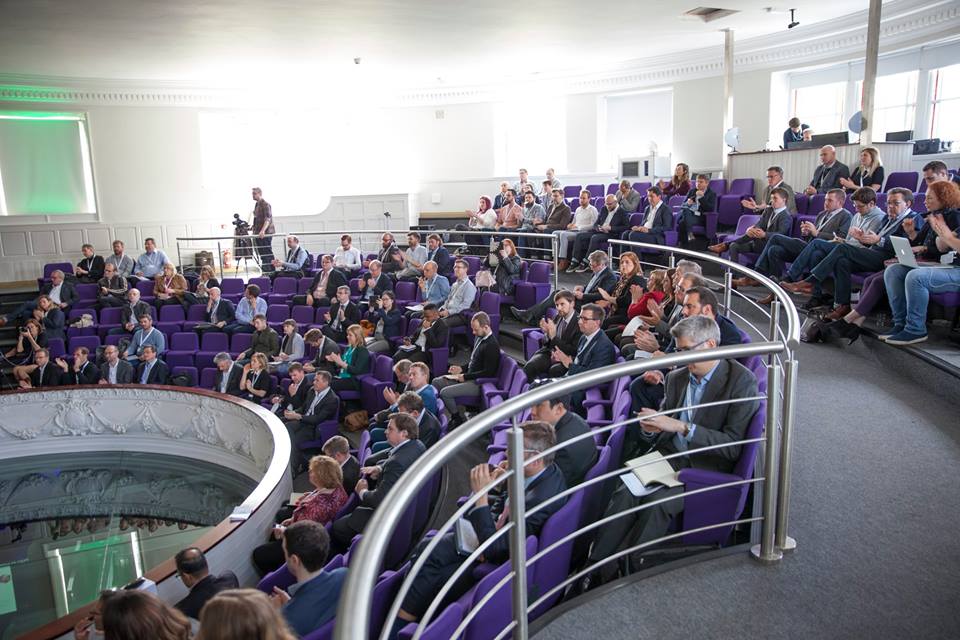
The doors opened at 8am, and queues formed as registration took place and guests made their way to enjoy the welcome breakfast and coffee.
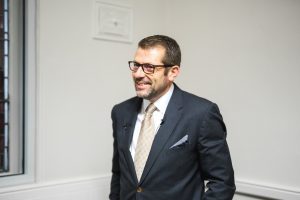 Following a few introductory words from Whitecap Consulting Director, Julian Wells, Dr. Chris Sier, FinTech Envoy for the North and the event’s chairman, took to the stage to formally open the event. He gave a brief overview of the term “FinTech”, and explained his motivation behind his passion: the societal impact the sector can have.
Following a few introductory words from Whitecap Consulting Director, Julian Wells, Dr. Chris Sier, FinTech Envoy for the North and the event’s chairman, took to the stage to formally open the event. He gave a brief overview of the term “FinTech”, and explained his motivation behind his passion: the societal impact the sector can have.
The first of the two morning sessions focused on the FinTech Landscape and FinTech Fundamentals. Here, we take a closer look at the speakers and their subjects.
Christopher Woolard, Executive Director of the FCA
 Christopher Woolard discussed how the FCA can support innovation, learn from firms, and adapt rules and policies to facilitate innovation. He encouraged diversifying the focus that is currently placed largely on London, to expand to what he cites as two particularly interesting areas: Glasgow and Edinburgh, and Leeds and Manchester. The FCA have begun working with both local and national governments, and are already seeing progress. They want to continue with this over time, breaking down barriers, offering support and facilitating innovation. He extended an open invitation to all those in attendance, offering them the opportunity to speak to him and seek advice throughout the course of the day.
Christopher Woolard discussed how the FCA can support innovation, learn from firms, and adapt rules and policies to facilitate innovation. He encouraged diversifying the focus that is currently placed largely on London, to expand to what he cites as two particularly interesting areas: Glasgow and Edinburgh, and Leeds and Manchester. The FCA have begun working with both local and national governments, and are already seeing progress. They want to continue with this over time, breaking down barriers, offering support and facilitating innovation. He extended an open invitation to all those in attendance, offering them the opportunity to speak to him and seek advice throughout the course of the day.
FinTech Landscape Panel
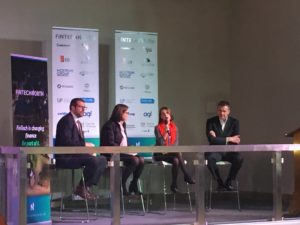 Dr. Chris Sier chaired a panel which featured Flora Hamilton, Head of Financial Services at the Confederation of British Industry, Richard Carter, the Chief Executive of Nostrum Group, and Laura Bailey, CEO of Zerado.
Dr. Chris Sier chaired a panel which featured Flora Hamilton, Head of Financial Services at the Confederation of British Industry, Richard Carter, the Chief Executive of Nostrum Group, and Laura Bailey, CEO of Zerado.
The discussion touched on the importance of Leeds and the need for connectivity. “Why can’t we have connectivity between the London hub and the other clusters throughout the UK?” asked Flora Hamilton, who also cited innovation as the way in which we will be able to solve problems in our economy.
Karoli Hindriks, Founder, Jobbatical
An inspiring speech by Karoli Hindriks, Estonian entrepreneur and motivating speaker, followed the panel. She looked back to the time when there was a meticulous recipe for a very clear trajectory and professional success, and commented on how times have changed, and how the financial crisis upended opinions about job security.
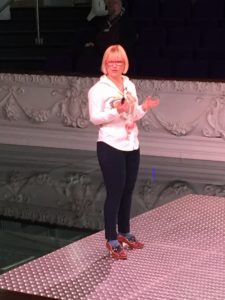 Karoli explained how the globalisation of both our personal and professional spheres affect our choices. “Connections aren’t local anymore. This means that people are more and more comfortable in moving around.” She also cited the desire to be different and discover new experiences, along with improved ease of travelling, as a catalyst for the evolving global workforce.
Karoli explained how the globalisation of both our personal and professional spheres affect our choices. “Connections aren’t local anymore. This means that people are more and more comfortable in moving around.” She also cited the desire to be different and discover new experiences, along with improved ease of travelling, as a catalyst for the evolving global workforce.
Karoli founded Jobbatical two years ago, with the conviction that today, we can build a global company anywhere on the planet. Not only does Jobbatical help individuals and organisations, but also, in Karoli’s own words: “We believe that this will help society to become more tolerant, to become more creative.”
Karoli is a firm believer in diversity, explaining that she learns something new every day by spending time with her very diverse team. She pointed out that we are quick to comment on success, without necessarily appreciating the reasons behind it, such as the diversity that has contributed to the success of Silicon Valley. She also questioned the idea of a comfort zone, raising the important question as to whether we hire the best people for the job, or simply the people we’re most comfortable hiring.
Tania Ziegler, Research Programme Manager, Cambridge Centre for Alternative Finance & Dr. Mark Davis, Associate Professor of Sociology, University of Leeds
 Tania, an expert in the researching field, presented some of her findings in FinTech. She commented that the FinTech phenomenon is changing the way people do business and causing a shift in mentality. FinTech companies are becoming the first port of call, rather than an afterthought or secondary option. Last year, 14% of small business loans came from a FinTech company. That number is expected to be higher this year, and will be revealed in an upcoming report to be published by the CCAF.
Tania, an expert in the researching field, presented some of her findings in FinTech. She commented that the FinTech phenomenon is changing the way people do business and causing a shift in mentality. FinTech companies are becoming the first port of call, rather than an afterthought or secondary option. Last year, 14% of small business loans came from a FinTech company. That number is expected to be higher this year, and will be revealed in an upcoming report to be published by the CCAF.
Tania commented on the expected trajectory of 2017. She advised that there may be some contraction in the UK and the USA, while triple digit growth is expected to continue elsewhere, citing Mexico and Chile as examples.
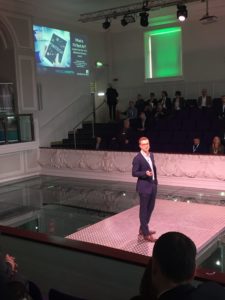 Dr. Mark Davis, University of Leeds professor, posed the grand question “What is FinTech for?” before going on to dissect findings. In his research, he found that some investors only invest a relatively small proportion of their overall portfolio to FinTech; money they would be “prepared to lose.” A better ROI was given as the principal motivation for opting for FinTech, and as little as 15 seconds was the time cited by some as the time spent making investment decisions.
Dr. Mark Davis, University of Leeds professor, posed the grand question “What is FinTech for?” before going on to dissect findings. In his research, he found that some investors only invest a relatively small proportion of their overall portfolio to FinTech; money they would be “prepared to lose.” A better ROI was given as the principal motivation for opting for FinTech, and as little as 15 seconds was the time cited by some as the time spent making investment decisions.
Mark considered the future of FinTech, posing three scenarios worth consideration. Status quo innovation would mean continuing on the same FinTech path, making improvements but not fundamentally changing its course. Disruptive innovation would reconnect people more closely with the asset they invest, leading to greater transparency and control. The third option, transformative innovation, would shift power relationships in order to meet the needs of all members of society.
Sara Parker, UK Portfolio Director, VocaLink
 VocaLink is, according to Sara Parker, “the most important company you’ve never heard of.” It’s the company that processes 90% of salaries across the UK; we are inclined to believe her.
VocaLink is, according to Sara Parker, “the most important company you’ve never heard of.” It’s the company that processes 90% of salaries across the UK; we are inclined to believe her.
Sara gave us insight into VocaLink, explaining that £4.8 trillion was processed in BACS payments in 2016, and £1.2 trillion was processed in faster payments in the same year. £140 billion was withdrawn from ATMs throughout last year, and 11.7 billion transactions were processed in total. After highlighting the enormity of the industry and the importance of payments in today’s financial world, Sara went on to comment on ever-increasing consumer demand, for real-time payments and immediate actions, and the associated risk of fraud.
FinTech Fundamentals Panel
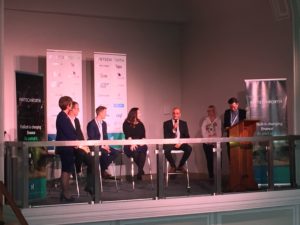
Julian Wells chaired the second panel of the day, asking the participants, including Professor Hussein Abdou of Manchester Metropolitan University, about the future of FinTech in education. Professor Abdou explained that universities have started or will start to introduce relevant courses related to the sector, and the general consensus was that the financial field will need highly-trained graduates from university. Collaboration between business schools and computing schools will be essential to educate future professionals. As Sara said, everyone involved in FinTech needs to be in touch and communicate regularly.
A lunchtime break followed this panel, before the afternoon session, which covered Innovators and Game Changers.
Daniel Rajkumar, Founder & Managing Director of rebuildingsociety.com and White Label Crowdfunding
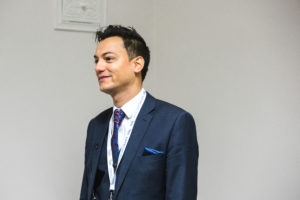 Daniel opened the afternoon session, as he took to the transparent floor to tell attendees about his journey with rebuildingsociety.com, as he took it from a concept to become an FCA-authorised peer-to-peer lending platform.
Daniel opened the afternoon session, as he took to the transparent floor to tell attendees about his journey with rebuildingsociety.com, as he took it from a concept to become an FCA-authorised peer-to-peer lending platform.
He explained some of the challenges he and his team faced, how they’ve overcome them, and how White Label Crowdfunding was born as a result. He expanded on some of the FCA-related topics concerning crowdfunding and peer-to-peer lending, and shared his enthusiasm for the industry with the audience.
You can watch a live video of Dan’s speech on the White Label Crowdfunding Facebook page.
David Beardmore, Commercial Director, Open Data Institute
 An interesting presentation by David Beardmore, of the Open Data Institute, followed Daniel’s speech. The Open Data Institute inspires innovation, connects people around the world, and aims to promote and encourage the use of open data. David spoke about open data, explaining what data is open, and what isn’t, and posing the question: how can we make it easier for consumers? He also asked the audience how long they had had the same bank account, and cited research that showed that over half the population of the UK has had the same bank account for 10 years or more; and a third for 20 years or more. An open banking initiative plans to make finding out which bank suits each individual easier.
An interesting presentation by David Beardmore, of the Open Data Institute, followed Daniel’s speech. The Open Data Institute inspires innovation, connects people around the world, and aims to promote and encourage the use of open data. David spoke about open data, explaining what data is open, and what isn’t, and posing the question: how can we make it easier for consumers? He also asked the audience how long they had had the same bank account, and cited research that showed that over half the population of the UK has had the same bank account for 10 years or more; and a third for 20 years or more. An open banking initiative plans to make finding out which bank suits each individual easier.
Chris Gorst, Challenge Lead, Open Up Challenge
 The Open Up Challenge is designed to inspire the creation of next-generation services, apps and tools, created for the UK’s five million small businesses. Chris Gorst told FinTech North attendees more about the challenge, detailing the cash awards, sandbox access and technical and business support offered to winners. The idea is to support and encourage innovators dedicated to building next generation services focused on the needs of small businesses.
The Open Up Challenge is designed to inspire the creation of next-generation services, apps and tools, created for the UK’s five million small businesses. Chris Gorst told FinTech North attendees more about the challenge, detailing the cash awards, sandbox access and technical and business support offered to winners. The idea is to support and encourage innovators dedicated to building next generation services focused on the needs of small businesses.
Open Banking Panel
After Chris Gorst’s introduction to the Open Up Challenge, a panel which included Laura Bailey, CEO of Zerado, David Beardmore, Alex Letts, CEO of Ffrees and Mark Santall, Product Manager at Open Banking Limited, pondered whether open banking would form the future of small business banking. Alex Letts, for example, of Ffrees, a company which offers four types of current account designed to allow users to manage money and save, commented that he wants it to be easier to move bank accounts, and the others gave their opinions on related topics.
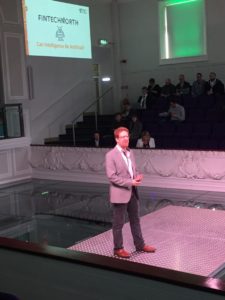 Stuart Sherman, Founder, IMC
Stuart Sherman, Founder, IMC
Stuart flew in from Toronto to speak at FinTech North. His captivating speech began with some audience participation; he then went on to explain machine learning, and how machines can recognise patterns and be trained, before eventually training themselves. The founder of IMC also gave us an insight into chat bots, explaining the algorithms behind them and saying that they can deduce when to pass calls to real people. He highlighted the need to teach and set boundaries for machines, and also touched on the topic of neurolinguistics pattern matching before closing.
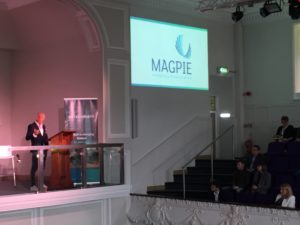 Stephen Kennedy, CEO, Magpie International
Stephen Kennedy, CEO, Magpie International
Stephen’s presentation, titled Reimagining the Customer Journey from A to D, focused on the customers. He commented on the idea of combining various user interfaces, rather than each individual having numerous interfaces, each one holding the same data. Companies would then own an interface, rather than a bank or a company; like Airbnb.
Stephen also spoke about the topic of trust, and using data to enhance the relationship between company and customer, without breaking the latter’s trust, a balancing act which involves both relevance of communication and permission granted.
He also mentioned the transition from analogue to digital, explaining the need for collaboration and partnerships; prioritising agile over waterfall decision making and underlining the importance of speed to market. He concluded by saying that digital distribution in financial services is happening, and will continue.
Laura Bailey, CEO, Zerado
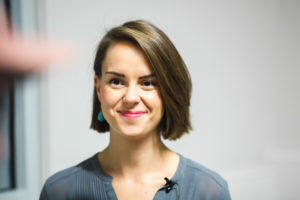 Laura introduced herself and company Zerado, a consultancy and product development company dedicated to blockchain technologies and their implementation. Citing statistics such as the average Londoner uses cryptography, often unknowingly, up to 1,000 times a day, Laura talked about the acceleration of financial technology, and cited the north of England as a driving force, commenting that the region is redefining the culture of FinTech with a more efficient ecosystem.
Laura introduced herself and company Zerado, a consultancy and product development company dedicated to blockchain technologies and their implementation. Citing statistics such as the average Londoner uses cryptography, often unknowingly, up to 1,000 times a day, Laura talked about the acceleration of financial technology, and cited the north of England as a driving force, commenting that the region is redefining the culture of FinTech with a more efficient ecosystem.
Game Changers Panel
 The day drew to a close with a panel chaired by Stefan Haase, Director of Whitecap Consulting. He was joined by Professor Hussein Abdou, Stuart Sherman, Nick Williamson, CEO and Founder of Credits, and Stephen Kennedy. Stuart explained the need to offer consumers solutions that aren’t too complicated or complex, and touched on his topic of AI and its ability to replace certain human elements of business. The issue of trust was once again raised, with Nick Williamson explaining that finance involves strategies for managing both trust and risk.
The day drew to a close with a panel chaired by Stefan Haase, Director of Whitecap Consulting. He was joined by Professor Hussein Abdou, Stuart Sherman, Nick Williamson, CEO and Founder of Credits, and Stephen Kennedy. Stuart explained the need to offer consumers solutions that aren’t too complicated or complex, and touched on his topic of AI and its ability to replace certain human elements of business. The issue of trust was once again raised, with Nick Williamson explaining that finance involves strategies for managing both trust and risk.
The Chairman’s closing remarks from Dr. Chris Sier marked the official end of the programme. Speakers, participants and attendees took the opportunity to meet and network during the informal drinks reception that followed.
FinTech North 2017 was a great success. Thank you to everyone who was involved, as speakers, panel participants and attendees. We look forward to hosting FinTech North 2018!